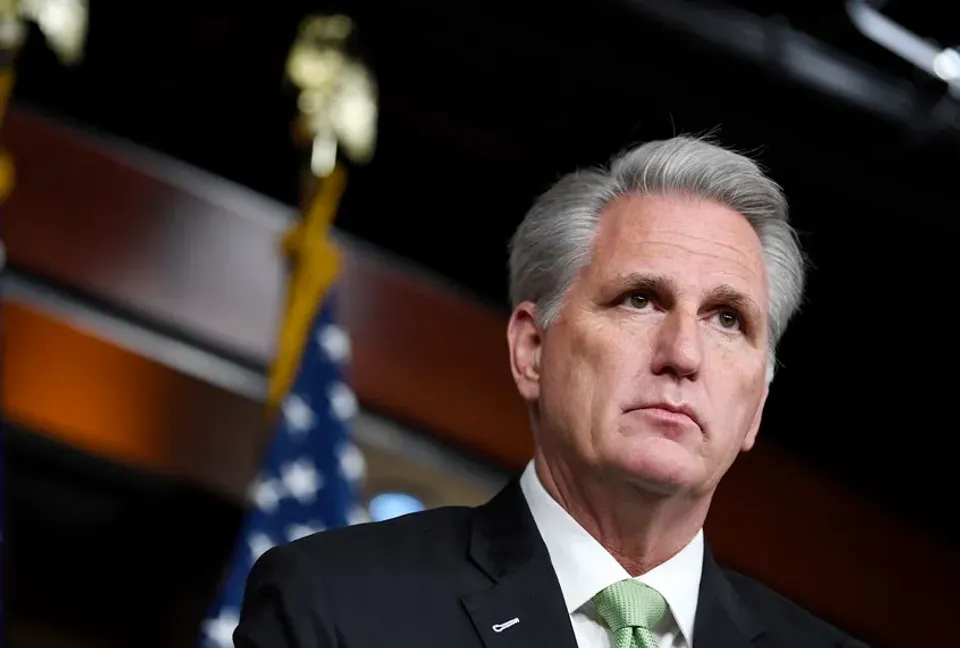
In an historic vote today, Kevin McCarthy, the Speaker of the United States House of Representatives, was removed from his position after a House vote. The “motion to vacate” – the process by which a Speaker is removed – was held on Tuesday afternoon, less than ten months after McCarthy took office as Speaker.
The motion was called by Florida Congressman Matt Gaetz, a member of the far right of the Republican Party and a longtime supporter of President Donald Trump, after McCarthy sought to reach a budget deal with the Democrats last week in order to avoid a government shutdown. McCarthy’s 45-day stopgap deal came with the threat of an attempt from Gaetz to remove him from office should he seek a deal; ultimately, eight Republican members of Congress joined forces with all 208 Democratic members to back Gaetz’s motion to remove McCarthy. With this motion, McCarthy is the first Speaker in US history to be removed from office by a vote.
McCarthy never managed to have an easy time with the Speakership. You may recall that, back in January of this year, it took fifteen rounds of voting before McCarthy could be confirmed as House Speaker; many of the far right of the Republican Party – particularly those within the right wing House Freedom Caucus – saw McCarthy as being too close to the establishment (Gaetz has referred to him as a “creature of the swamp”), while House Democrats consistently voted for Hakeem Jeffries, the House Minority Leader, for Speaker. McCarthy’s difficulty was steeped in the fact that the Republicans barely scraped a majority in the House of Representatives in the 2022 midterm elections, which led to rounds of voting without a positive outcome; even after the fifteenth round, McCarthy only scraped through with 216 votes – fewer than the 218 needed.
As Speaker, McCarthy still found it difficult to get business through Congress; however, he did have some achievements given difficult circumstances; working with the administration of President Joe Biden, McCarthy managed to avoid a debt ceiling crisis which would have seen the US default on its national debt for the first time in history; this led to the passage of the bipartisan Fiscal Responsibility Act. McCarthy also managed to strike a deal with House Democrats in order to avoid a government shutdown, which would have been the first under the Biden administration. However, as mentioned earlier, it was this deal that ultimately led to McCarthy’s downfall.
So now that the office of Speaker of the House of Representatives is vacant, what happens next? In the immediate term, Rep Patrick McHenry of North Carolina will serve as acting Speaker until the House Republicans can elect a new Speaker (the House Democrats will also nominate a candidate of their own, most likely to be Jeffries). It is unknown which Republican candidates will come forward, but McHenry, House Majority Leader Steve Scalise of Louisiana and House Majority Whip Tom Emmer of Minnesota – all McCarthy allies – could possibly put themselves forward. It is likely that a candidate from the right wing of the Republican Party could step forward – possibly even Gaetz himself.
However, with a majority of votes needed to win (with no discounts for absences in the vote), unless a candidate can unify the entire Republican Party, we are likely to see another drawn-out process. And with a Presidential election looming – one which will likely see Donald Trump as the Republican candidate – the prospective Speaker will likely be fighting a battle on two fronts: one to gain the support of the House Republicans, and one to at least not invoke Trump’s ire – particularly if they are not a close supporter of the former President.
Despite the chaos and inefficiency of business in the House of Representatives under Kevin McCarthy’s leadership though, it is still worth mentioning that he at least tried to find deals in order to get business through Congress. Simultaneously accused of being a Trumpist and a member of the establishment, and being controlled by both the far right and the Biden administration, McCarthy’s job was never going to be easy. To leave a good word for him, even though he believed he could survive the motion to vacate, he sought to struck a deal with Democrats (the same Democrats who unanimously went on to vote to remove him) in order to avoid a government shutdown, even though he knew it would put his job on the line; that in itself has to be worth something.
The vote to elect a new Speaker of the House of Representatives will take place later this month. With the level of partisanship in American politics being what it is, however, it is likely that any candidate for Speaker would struggle to vin a vote with such a slim Republican majority. Furthermore, with the Republican Party being more divided than ever, I don’t necessarily see that any other candidate might do a better job at unifying the Republican Party than McCarthy could. In any case, removing McCarthy may have been the goal of far right figures like Matt Gaetz, but it doesn’t look as if any of the Republicans’ problems are likely to be resolved by his removal.